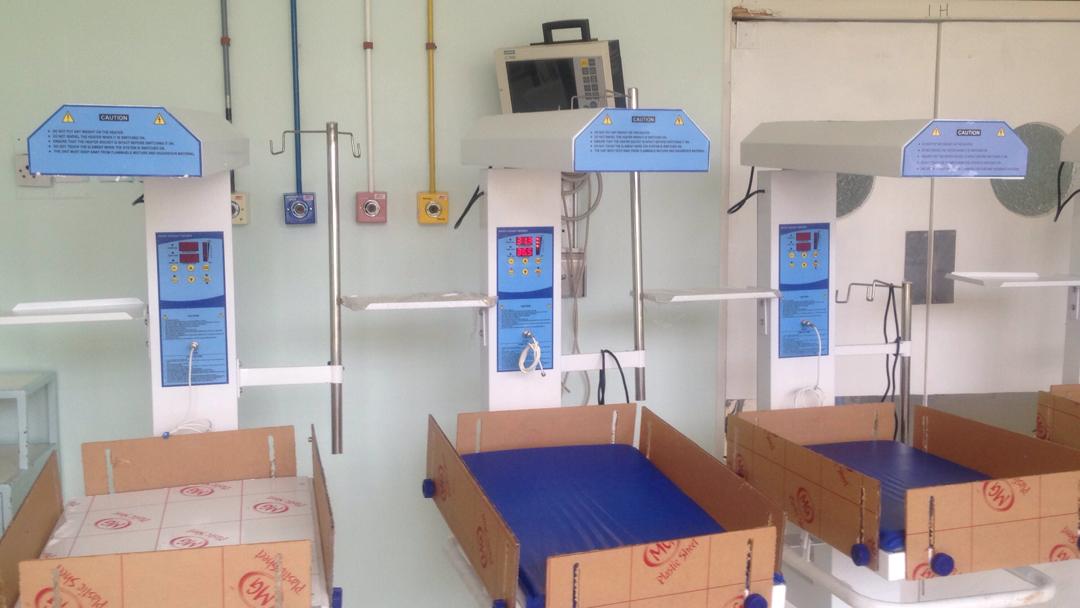… as three babies share one incubator
One of the country’s major referral hospitals – Mpilo Central Hospital received a donation of specialised equipment from the Office of the President (OPC), who sourced it in India.
The machinery was unveiled Wednesday to representatives of the Minister of State for Bulawayo and is expected to improve services offered at the institution.
The donated equipment includes incubators, monitors, anaesthetic machines, an X-ray machine among others.
“This is a sign that government is making serious efforts to revive health institutions so that we provide quality services,” said the hospital’s Chief Executive Officer, Leonard Mabandi.
Mpilo’s Clinical Director, Dr Solwayo Ngwenya, noted that some of the components had not arrived from India but would be delivered in due course.
“Engineers have assembled those parts that were available and took down a list of what is still needed. They have since flown back to India but will return,” he said.
After touring the hospitals, Dr Mary Nyathi who was representing Mpilo Board chairperson Sichelesile Moyo-Ncube, told CITE that the machines, particularly the incubators meant for the neonatal unit, would revolutionise the clinical management of babies.
“There are four types of important machines, there are incubators to keep premature babies and very sick children warm and safe in a good environment. Currently, three small premature babies share an incubator and that leads to serious infection as one child infects another in the unit. Mpilo neonatal’s unit has serious problems with infection,” she said.
Dr Nyathi, who is a pediatrician, said more incubators and monitors meant life for critically ill babies.
“When a little baby is born or is in ICU, or neonatal intensive care unit, we need to monitor their temperature and oxygen. If you give too much oxygen, it damages the baby’s lungs and if you don’t give enough they die. So you need to have a machine to monitor that oxygen and also have a machine that monitors their heart rate.
“If a baby’s heart rate goes up very high, we have problems and if the heart rate goes down below 100 the baby needs resuscitation. It is critical that these nine monitors for Mpilo will go a long way towards reducing deaths from too much oxygen,” explained the pediatrician.
She noted that a study in Malawi showed that babies who died often were the ones who became cold while procedures were being done inside the incubators.
“The infant radiate warmers are open incubators which have heat and light, so when doing a procedure, it doesn’t become cold. Therefore it is absolutely essential that Mpilo does a study and see how much difference to our mortality, these machines will have as they are a very important contribution,” Dr Nyathi said.
Dr Nyathi added that Mpilo had almost run out of ventilators but a ventilator was on the way. “This means when children fail to breathe we can help them breathe, they can stay there for three days but they will breathe,” she said.
“Then we have real life savers, the machines which help babies breathe. When a premature baby is born, for the first three days, their lungs are too premature to breathe for themselves where people can afford it, we give them what we call surfactant (a drug) to help children breathe.”
According to Dr Nyathi, surfactant is expensive, as it costs about US$4500 for 4ml to 8ml.
“But with these Bubble CPAP machines and dexamethasone, they will go a long way to the survival of babies. These machines will help the small premature babies and this donation is really helpful,” the pediatrician said.
Mpilo Chief hospital Equipment Technician, Vulindlela Dube, said although some components were yet to come down from India, the hospital would make do with what was available.
“The hospital was quite in a critical condition but what the president did is a big donation, which shows his resolve to assist hospitals here in Zimbabwe especially those central institutions, as they serve a large community,” he noted.
Dube said the donated equipment consists of “two anaesthetic machines, 12 Bubble CPAP machines, three infant incubators, eight infant warmers, one endoscopy unit, two ventilators, 20 NIPPV machines, 25 monitors, a colonoscopy unit and a mobile X ray machine.”


